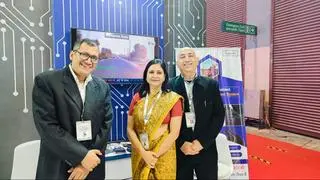Bejul Somaia, Managing Partner, Lightspeed India Partners LLP, which advises Lightspeed Venture Partners, an early-stage venture capital firm, believes the days of easy money and high valuations for start-ups are over.
This, he feels, is good for the entrepreneurial ecosystem in the long run as the focus will be more on long-term sustainable growth, rather than just “growth, growth, growth”.
“I would say things are cooling down. Capital is becoming scarce. Investors are asking more nuanced questions. The emphasis will shift beyond growth alone to sustainability of growth, differentiation, quality of growth and a lot of those things,” says Somaia.
Lightspeed is an early-stage venture capital firm with a total of $3 billion under management. It invests in the US, India, Israel and China.
He draws attention to media reports of companies laying off staff or shutting down operations in some cities and says, “this is a function of the increased focus and belt-tightening that happens because capital is getting tighter.” He adds that this cooling down is happening across geographies. And, in each case, the reasons are different.
China’s effectAccording to him, a lot of the froth and excitement that happened in India and some of the cooling-off are linked to what is happening in China. For many investors, India represents that world’s next big Internet market. And much of the early-stage investment activity in India is correlated with value creation in similar areas in China. So, what happens in China impact India, even though nothing has fundamentally changed here. When sentiment starts to turn a little negative, investors typically start seeing more risk. You have these cycles where greed exceeds fear and you have cycles where fear exceeds greed.
“I would say we are moving from a cycle where capital was relatively freely available to one where sentiment just begins to become a little bit negative and that, therefore, impacts how the community behaves,” he says.
Somaia draws the analogy of someone wanting to invest in real estate as property prices seem to be going up and the sector seems attractive. Because of a perception that there is ‘easy money’ to be made, more people invest in property. At some point, there is a property glut because of which sellers are unable to sell at their desired price. For sometime, till that excess inventory in the market gets worked out of the system, prices remain depressed and liquidity is not available. This happens in every industry, especially those that are cyclical such as steel, cement and sugar. It is the cyclicality of an industry. It just happens to be the case with the venture and start-up industry now.
Even in this kind of a situation, Somaia sees a silver lining. “In all of this, what I think is very positive is the underlying trend-lines are as strong as they have ever been.”
Consumer adoption of technology, mobile phone penetration, data usage and penetration, quality of entrepreneurs, all these are just going in one direction. “I am actually very happy that there is a relative cooling down because underlying all of this, the opportunity hasn’t changed. There will be more focus on sustainability and differentiation, there will be more focus on the right things, including companies that are long-term sustainable rather than growth, growth, growth,” he emphasises.
Business strategyOn Lightspeed’s strategy, he says the Indian arm can draw from the global pool, but it recently raised a $135 million dedicated fund for early-stage investments in India, its first for the country. The VC firm is partial to sectors that have a strong technology focus or are technology enabled. Its preferred sectors are consumer technology, enterprise tech, mobile, financial technology and payments.
Across multiple rounds, Lightspeed can invest anything from $2 million to $25 million for a significant minority stake, with the sweet spot being 20-25 per cent.








Comments
Comments have to be in English, and in full sentences. They cannot be abusive or personal. Please abide by our community guidelines for posting your comments.
We have migrated to a new commenting platform. If you are already a registered user of TheHindu Businessline and logged in, you may continue to engage with our articles. If you do not have an account please register and login to post comments. Users can access their older comments by logging into their accounts on Vuukle.